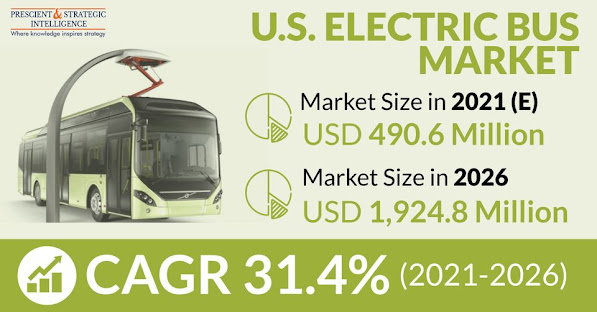U.S. Electric Bus Market Projected to Garner Significant Revenue
The increasing concerns being raised by several environmental agencies and local governments over the rapid deterioration of air quality are driving the demand for electric buses in the U.S. As vehicular emissions contribute heavily toward the escalating air pollution levels, the degradation of the environment is propelling the deployment of electric buses in the country. Presently, conventional diesel-powered buses are a major part of the public transportation system, but they contribute massively toward the soaring greenhouse gas emissions.
Moreover, the enactment of strict environmental regulations is also positively impacting the deployment of these buses in the country. Besides these factors, the falling prices of lithium-ion batteries are also supporting the expansion of the U.S. electric bus market, which will witness a surge in its revenue from $490.6 million in 2021 to $1,924.8 million by 2026. According to the estimates of the market research company, P&S Intelligence, the market will demonstrate a CAGR of 31.4% from 2021 to 2026.
The average price of lithium-ion battery cells for large orders fell from nearly $1,000 per kilowatt-hour (kWh) to approximately $310/kWh in 2019. Since the battery accounts for nearly 25–40% of the total manufacturing cost of an electric bus, the falling prices of these batteries would assist bus manufacturing companies in keeping the prices of the buses under check. Further, it is predicted that the prices of electric vehicles, including electric buses, would plunge, owing to the rising operational efficiencies, in the coming years, which will also boost the sales of electric buses in the country.
In the U.S., inductive, pantograph, and plug-in techniques are used for charging electric buses. Out of these, the demand for the inductive charging type is predicted to rise at the fastest pace in the country over the next few years. This will be because of the ability of the technology to rapidly charge the electric buses. Furthermore, many manufacturers of these charging systems are focusing on collaborations and partnerships with bus manufacturers and several public transit authorities for augmenting the deployment of these systems.
Currently, electric bus manufacturers in the U.S. are focusing on geographical expansions and partnerships to strengthen their position in the industry. For example, BYD and Levo Mobility LLC, which is a joint venture of Nuvve Holding Corp., affiliates of Stonepeak Partners LP, and Evolve Transition Infrastructure LP, which offers fleet-as-a-service (FaaS) solutions that allow fleets to switch to electric vehicles, entered into a collaboration in October 2021 for integrating Nuvve’s V2G technology with the battery electric vehicles (BEVs) of BYD and facilitating the launch of up to 5,000 BEVs over the next five years.
Hence, it can be said without hesitation that the sales of electric buses will surge sharply in the U.S. in the coming years, primarily because of the growing need for eco-friendly vehicles, on account of the soaring air pollution levels and increasing implementation of strict environmental policies and declining prices of lithium-ion batteries in the country.




Comments
Post a Comment